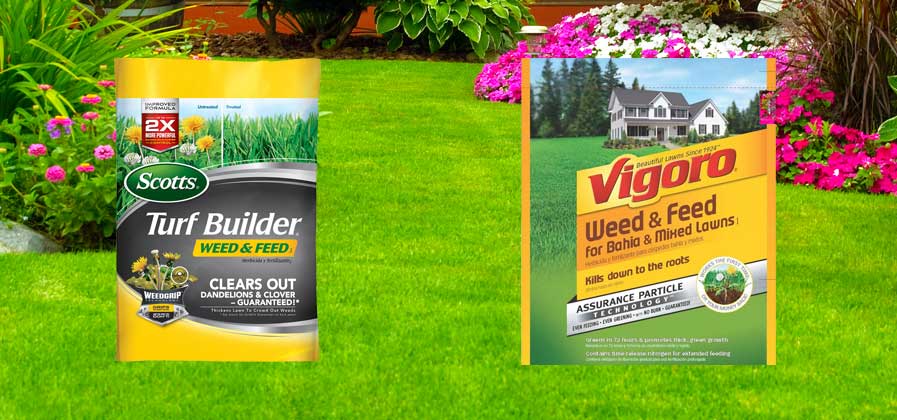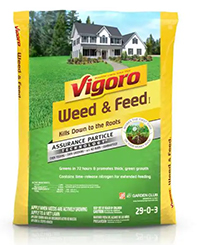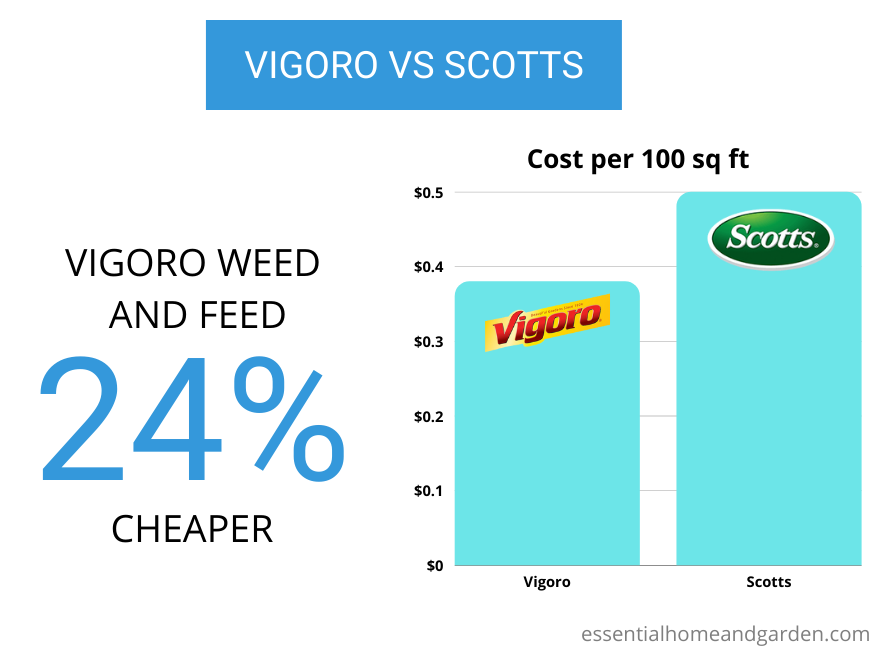For some of us, our lawn is our pride and joy, we don’t spend all our time on our cars or fancy home entertainment systems… what we really enjoy is mowing our lawns and making it look just perfect. And a big part of that is using the right lawn fertilizer. Generally, when you talk about lawn fertilizers, the discussion comes down to two competing brands: Scotts Fertilizer vs Vigoro Fertilizer.
But, which is actually better? Which should you use? In this article, we will look at both of those questions and attempt to help you pick the lawn fertilizer that is right for you.
Scotts vs Vigoro Results Summary
For the purpose of this article, we chose to test the most popular lawn fertilizer from each brand.A summary of the results is below, more details can be found below the table:
Ease Of Application – How To Apply Lawn Fertilizer
The application of Vigoro Fertilizer vs Scotts Fertilizer is almost identical. So its not really possible to pick a winner here.
The procedure basically goes like this:
- Do not apply if rain is forecast. Rain will wash the fertilizer away before it does its magic.
- Fill your chosen fertilizer spreader (see our list of the best fertilizer spreaders here) and set it as per the fertilizer instructions.
- Ensure the lawn is wet either from dew or from a light watering.
- Apply the lawn fertilizer.
Cost
Vigoro Weed and Feed is sold for around $19 for a 15lb bag. This 15lb bag fertilizes up to 5,000 sq. ft.
So, using the maths that we learned at school, that means that $for every 100 sq. ft of lawn fertilized with Vigoro Weed And Feed, it will cost you about $0.38
Now, let’s do the same maths for Scotts Turf Builder Weed and Feed.
A 15lb bag of Scotts Weed and Feed will set you back about $25, and this also fertilizes up to 5,000 sq. ft.
For every 100 sq. ft of lawn fertilized with the Scotts product, it will cost around $0.50
Want to see that in terms of percentage? Well, that means that it costs you 31.5% more to fertilize with Scotts Weed and Feed.
If you like graphs, here is one that shows it clearly.
But hang on…
For some of you, that may be all you need to know to make a decision, but the cost is only a small part of our verdict. So let’s move on and look at how each company performs with regards to customer support.
Customer Service
This is another area where the Scotts and Vigoro differ quite substantially.
Online Presence
When I did a quick Google search on how to use each product, the results were quite different.
The results for “Scotts weed and feed instructions” came up with links to the Scotts website that had all the required instructions and handy tips.
However, the results for “Vigoro weed and feed instructions” were quite different. All I got for “Vigoro” were links to big retailers that just wanted to sell me the product and unhelpful reviews.
In fact, if you try to go to the Vigoro website (www.vigoro.com), it just takes you to Home Depot’s website. While this site did contain a few helpful tips, it was nowhere near as good as the information provided by Scotts.
Scotts Vs Vigoro: Customer Support Options
Vigoro Support Options
- General Home Depot support phone number
- Contact form
Scotts Support Options
- Online live chat
- Text line
- Support contact form
- Mailing address
- Dedicated Scotts support phone number
So I think the clear winner in customer support is Scotts Lawn Fertilizer by a long way.
It is MUCH easier to get into contact with Scotts and actually speak to someone that knows what they are talking about when it comes to the best lawn fertilizer for your grass and how to use it.
But once again, this is not the end of it. Now we look at how the product performs.
VIGORO VS SCOTTS – WHICH PERFORMS BETTER?
Ok, so this is where the article might get a bit contentious. Lawn fertilizer works differently for different people depending on many different factors, so for some people, Scotts fertilizer may work better, whereas for other people, Vigoro fertilizer is best.
I want to stress here that you need to pick the fertilizer that is right for you, your area, and your lawn. Go into your local garden shop and talk to them about it, ask your neighbors about what works for them and find out what their experience is with different brands.
For the purpose of this article, we obviously need to make a recommendation, so keep in mind that this section is based purely on our experience with each fertilizer.
Your experience may vary.
Our Experience With Scotts And Vigoro
We found that Scotts fertilizer produces a much more lush looking, dark green grass that looked great. We also liked the fact that the Scotts Turf Builder had a smaller particle size which we found was absorbed much quicker by the grass, producing results in a shorter time.
We did find that as far as killing existing weeds goes, it kills some but others still need to be removed the hard way. However, it is great at preventing new weeds from starting to grow and will save you a lot of weeding time in the long run.
The Vigoro Weed and Feed certainly made our test yard look more lush, but the greens were not as bright or natural looking. Vigoro performed very similarly to Scotts on the weed front and is much better for weed prevention than weed killing.
The particle size of the Vigoro Weed and Feed is quite a fair bit larger, and it does take longer to break down and be absorbed by the grass.
Scotts and Vigoro Weed and Feed Alternative
Sunday Lawn Care is a great alternative to Vigoro and Scotts weed and feed because of their personalized approach to lawn care. By analyzing your lawn’s specific needs based on soil, climate, and other factors, Sunday Lawn Care creates a customized plan for your lawn.
This allows for targeted treatment, rather than a one-size-fits-all approach. Additionally, Sunday offers troubleshooting plans to address common issues such as weeds and pet spots. With a focus on providing the right products at the right time, Sunday Lawn Care is a great choice for those looking for a more personalized and effective lawn care experience.
- Personalized lawn care: Sunday Lawn Care provides custom lawn plans based on soil analysis, climate data, and lawn needs.
- Convenient and eco-friendly: Sunday delivers lawn care products directly to your door, and their products are made with better ingredients that are safe for people, pets, and the planet.
- Science-backed formulas: Their products use transparent, bio-based formulas with effective ingredients like seaweed, molasses, and iron.
- Expert support: Sunday Lawn Care provides one-on-one support from a real person and offers a satisfaction guarantee.
So Which Is Better?
Unfortunately, there is no super clear winner here. If we had to choose one, then it would probably be Scotts Weed and Feed mainly because the results are slightly better, and their customer support is great. To us, this is more important than saving money.
But, if cost is important to you, then by all means go with Vigoro Weed and Feed. It still has great results and if you are an experienced lawn connoisseur, then you likely will not need any help from anyone anyway!
Hang on, we aren’t finished yet!
The final point we want to make is this: Do your research.
Yep, it really isn’t even hard to do so, go and talk to your local garden supplier. Take in a sample of your grass and ask them what type it is. Ask them what fertilizers are best for it.
Choosing the right lawn fertilizer depends on a number of factors, just some of these are:
- How much sun/shade your lawn gets
- The type of grass
- Your location
- How is the grass used? e.g. does it get a lot of foot traffic? Is it likely to get scuffed up?
- Will children or pets be on the grass regularly?
- How often you mow your lawn and what sort of mower you use.
- When you are applying it (in winter, use a winterizer)
- Which other lawn care tools you are using
Where To Buy
Scotts Turf Builder Weed and Feed is available on Amazon.
You can also get it directly from Scotts here
- Kills existing weeds and prevents future weed growth: Controls over 50 listed lawn weeds.
- Fertilizes and strengthens your lawn: In addition to killing weeds, this product also provides nutrients to your lawn to help it grow thicker and stronger.
- Suitable for use on multiple grass types: Safe to use on Bahiagrass, Bermudagrass, Bluegrass, Centipedegrass, Fescue, Ryegrass, and Zoysiagrass
Vigoro Weed and Feed is available from Home Depot
- Treats weeds down to the roots: This product not only feeds your lawn, but also kills weeds down to the roots, including clover, common chickweed, and dandelion.
- Greens in 72 hours: Vigoro Weed and Feed I with ASSURANCE Particle Technology promotes thick, green growth and shows results in just 72 hours.
- Extended feeding: This fertilizer contains time-released nitrogen for extended feeding, providing nourishment for up to 2 months.







Using Scotts Elite spreader. What setting should I use for Vigoro Lawn fertilizer ? Thanks Larry 🙂
I have a 5000 sq. ft. front lawn in Mobile, Al. It’s a mix of St. Augustine under the shady part and centipede in the area where the sun hits it like a hot anvil all day long three months out of the year. Vigoro has worked fine for me for several years since it’s 29-0-4 with slow release nitrogen. I apply it April 1 and June 1 with no further applications. As far as weed control, it’s never worked for me since my lawn service has to spot treat it for weeds. I’ve never tried Scotts but according to several articles including this one they’re pretty much the same just different in controlling pre-emergent vs existing weeds. Allow me to add that traditional thought is to cut the centipede 1″ to 2″ above the ground. All that has ever done is to kill my lawn in hot weather. The lawn service cuts it 3.5″ high and it’s the best looking lawn in the neighborhood all year long.
I think scotts and Vigoro are the same company…..an HD employee tipped me that. I looked it up….yep its true.
They are indeed owned by the same company. The products are different though.
how long does the fertilizer need to be on the lawn with no rain
You want ideally at least 24 hours without rain.
I find that i have burnt up portions of my lawn by using to much of any product. So to be save a little less product is far better than destroying the lawn which we have worked so hard to maintain. The major concern is weed destruction, the hose spraying type is the way to go, just a dusting type spray now and then
I applied per the bag instructions and now have clover in every line of application with the Vigoro. What’s up with that? Two years in a row this has happened. Never had that with the Scotts brand. Has anyone else experienced this?
Hello,
I have used both Scotts, and Vigoro weed and feed on my lawn.
My problem with weeds is not my yard, but my neighbors lawn. A test tube subject for how many weeds can be grown. Airborne weed particles make me diligent. I have had Scotts burn my lawn. Vigoro has never burned my lawn. It is true that Scotts results in a much darker vibrant green, almost Everest green. Vigoro results in a more vibrant green, like a Kelley green. My concern is not is savings, but results. If I am not mistaken Scotts bought Vigoro Company so as to have a monopoly on the market. The larger particles are easier to disperse. Scotts granules are small like sugar, and to me easier to make a mistake by overapplying.
I looked at the poor reviews, but I have been using Vigoro for over 20 years without incident. My Landscaper now uses Vigoro on his other customer’s lawn due to how my lawn looks after using. I am not sure what type of grass I have. I believe it’s a rye mix. Both full sun, and partial sun.
The results you get for each type can depend on numerous factors. Location, grass type, current season + lots more. Scotts did buy Vigoro, but the two products remain distinctly different.
Your math is wrong. 48 cents is 60% more than 30 cents. Or going the other direction, 30 cents is 37.5% cheaper than 48 cents. That’s a big difference from the 28% you cite in your article.
Thanks for pointing out the mistake! I have updated the info to show the correct figures with updated pricing.
We bought 8 bags of vigoro and went by the instructions I had a 1/2 acres so it is not cheep! The next day I had burn marks all over my lawn and it said that is don’t burn! I want my money back and who do I ask? and who will come fix my lawn?
Hi Dianne, How did you spread the fertilizer? I would suggest contacting Vigoro directly if you 100% followed their instructions.
I know this is over a year later but Martha the reason you had burn marks in your lawn is that you used way too much for the size of lawn you have. 1/2 acre is 21780 sq feet. 4 of the 5000 sq ft bags should have been enough if you applied it slightly sparingly.Rich
8 bags of what size? Sounds like a major case of over application to me.